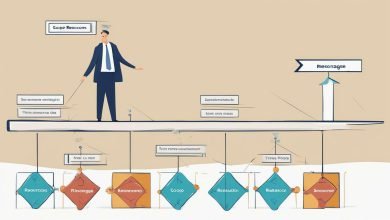
Conflict is an inevitable aspect of working in a team, whether it’s due to difference in opinions, work styles, or personalities. It’s essential to understand how to manage and resolve conflicts effectively to promote a culture of harmony and collaboration within the team. In this article, we’ll explore the importance of conflict resolution and teamwork, and provide strategies and techniques to foster a collaborative and productive work environment.
Key Takeaways:
- Successful teamwork requires the ability to navigate conflicts and promote harmony within the team.
- Effective communication is a critical component of conflict resolution and teamwork.
- Collaboration is essential for achieving team goals and resolving conflicts.
- Feedback plays a crucial role in conflict resolution and team development.
Understanding Team Conflicts
Conflict is a natural part of working in teams, and understanding the different types of conflicts that can arise is essential in resolving them. From personality clashes to disagreements over leadership and communication styles, conflicts can arise from a variety of factors. Therefore, it’s essential to develop conflict resolution strategies and conflict management techniques to address any conflicts that arise in teams before they become too disruptive.
One of the most effective conflict resolution strategies is to acknowledge and address conflicts as soon as they arise. When issues are ignored, they can fester and grow, leading to more significant problems down the road. Effective communication is also critical when resolving conflicts. Team members should feel comfortable expressing their concerns and sharing their thoughts on the conflict openly.
In addition to acknowledging and addressing conflicts, it is also important to listen actively to other team members. Actively listening ensures that everyone feels heard and understood. Understanding the other person’s perspective can help provide insight into the cause of the conflict, and provide a basis for developing a resolution strategy.
Assertive communication skills are also essential in conflict resolution. Using “I” statements instead of “you” statements can prevent team members from feeling attacked and defensive. Additionally, it is best to focus on the issue, not the person, when addressing conflicts. Avoiding placing blame on anyone and instead focusing on the issue at hand can help to maintain a respectful and open communication environment.
By employing conflict resolution strategies and conflict management techniques, teams can effectively manage and resolve conflicts. Addressing conflicts promptly and openly, actively listening to other team members, and using assertive communication skills can prevent conflicts from escalating and foster a more productive and harmonious team environment.
Building Effective Team Communication
Effective communication is key to managing and resolving conflicts within teams. By building strong communication channels, team members can prevent conflicts from arising, or address them before they escalate into more significant issues.
Active listening is a vital communication skill that enables team members to understand each other’s perspectives. Encouraging team members to share their thoughts and ideas in a safe and supportive environment promotes open dialogue and fosters a culture of respect. Conversely, refusing to listen could escalate minor issues into conflicts that can damage team cohesiveness and productivity.
Assertive communication skills can also be useful in resolving conflicts. When team members express their needs or concerns in a clear and respectful manner, they are more likely to be heard and understood. Encouraging team members to be assertive can prevent conflicts from escalating, and address concerns before they impact team performance.
In addition to these fundamental skills, there are several techniques that can help improve team communication, such as:
- Setting clear expectations for communication and collaboration among team members
- Encouraging regular feedback from team members to ensure open communication
- Using technology to facilitate communication, such as video conferencing, chat rooms, and online collaboration tools
By building effective team communication channels and fostering assertive communication skills, team members can prevent conflicts from arising and tackle them constructively when they do. By doing so, they can ensure that they work together harmoniously towards their shared goals.
Enhancing Collaboration in Teams
Collaboration is an essential component of successful teamwork, and fostering teamwork requires building trust and promoting open dialogue. Team members must work in harmony and understand their respective roles, strengths, and weaknesses to achieve shared goals. Here are some effective team collaboration methods:
- Encourage trust: To enhance teamwork, it’s crucial to create an environment of trust. Team members should feel comfortable sharing their thoughts and ideas without being judged or criticized. Managers should encourage team members to participate actively in activities and not micromanage them.
- Promote diversity: Diversity is crucial for team collaboration, as it brings new perspectives and ideas. Embrace diversity when forming teams and ensure that everyone is equal. Additionally, creating a culture that celebrates diversity fosters inclusivity.
- Encourage open dialogue and idea-sharing: Team members should feel free to share their ideas, problems, and feedback with other members. Encourage open communication by providing platforms such as team messaging systems and virtual collaboration tools. Teams can also hold regular brainstorming sessions to exchange ideas and solve problems collectively.
Applying these methods is key to work together in a harmonious way. However, it’s essential to note that creating such an environment takes time and effort from all members of a team. Once implemented effectively, teamwork will thrive, leading to successful completion of tasks and projects.
Conflict Resolution Techniques
When conflicts arise within a team, it’s essential to have effective conflict resolution strategies in place. The following techniques can help teams address conflicts and maintain harmonious relationships:
- Negotiation: This involves finding a compromise that satisfies all parties involved in the conflict. A negotiated solution can help maintain relationships and promote teamwork.
- Mediation: A mediator acts as a neutral third party to facilitate communication and negotiation between conflicting parties. This technique can help resolve disputes and find mutually beneficial solutions.
- Compromise: This technique involves finding a middle ground that all parties are willing to accept. It can help maintain relationships and promote teamwork while still addressing the conflict at hand.
- Collaboration: This technique involves working together to find a solution that benefits all parties involved. It requires active communication and a willingness to listen to all perspectives.
- Assertiveness: Sometimes conflicts arise due to misunderstandings or miscommunications. An assertive approach can help clarify expectations and resolve conflicts before they escalate.
By implementing these conflict resolution strategies, teams can effectively address conflicts and foster harmonious relationships. It is also essential to continue to develop conflict resolution skills within the team to prevent future conflicts from arising.
Teamwork and Performance Improvement
Effective teamwork and conflict resolution can significantly impact overall team performance. By enhancing communication, collaboration, and conflict resolution skills, teams can improve productivity, creativity, and job satisfaction.
When team members feel heard, valued, and respected, they are more likely to feel motivated and engaged in their work. This can lead to increased performance and a more positive work environment.
Additionally, when conflicts arise, team members who have developed strong conflict resolution skills can address and resolve issues quickly and efficiently. This prevents conflicts from escalating and causing further disruptions to team dynamics, ensuring that the team can continue to function effectively.
To enhance team performance and improve teamwork, it is crucial to prioritize open communication, active listening, and collaboration. By embracing and applying constructive feedback, team members can work together to identify areas for growth and development, driving continuous improvement within the team.
Embracing Constructive Feedback
Constructive feedback is a critical component of effective conflict resolution and teamwork. It involves giving and receiving feedback in a manner that promotes growth and development while avoiding defensive or harmful reactions.
Effective feedback requires active listening, empathy, and a non-judgmental attitude. When giving feedback, focus on specific behaviors or actions rather than criticizing the person. Start with positive feedback and then offer constructive feedback framed as suggestions for improvement.
When receiving feedback, listen actively and avoid getting defensive. Ask clarifying questions if needed and demonstrate a willingness to learn and improve. Remember that receiving feedback is an opportunity to grow and develop, and constructive criticism can be useful in improving teamwork and conflict resolution skills.
In conclusion, embracing constructive feedback is essential for improving teamwork and conflict resolution skills. By providing and receiving feedback effectively, team members can grow and learn together, ultimately leading to greater success and productivity.
Fostering Harmony and Collaboration in Teams: Conclusion
As we have seen throughout this article, conflicts can arise within teams and have a negative impact on performance. However, by unraveling conflicts and fostering harmony and collaboration, teams can achieve success.
Effective conflict resolution strategies and techniques, coupled with open and effective communication channels, can prevent and manage conflicts within teams. Building trust, promoting diversity, and encouraging idea-sharing can enhance collaboration, leading to improved job satisfaction, creativity, and productivity.
Furthermore, embracing constructive feedback and promoting growth and development within teams can lead to improved teamwork and overall performance. By prioritizing teamwork and conflict resolution skills, teams can navigate conflicts effectively and achieve success.
Remember:
Unravel navigating conflicts, foster harmony, and encourage collaboration in teams to achieve success.
Implement effective conflict resolution strategies and techniques, build open and effective communication channels, and prioritize teamwork and constructive feedback to navigate conflicts and achieve overall success.
FAQ
Q: What is the importance of fostering harmony and collaboration within teams?
A: Fostering harmony and collaboration within teams is crucial for achieving success. It promotes positive working relationships, enhances communication, and encourages the sharing of ideas and perspectives.
Q: What are some conflict resolution strategies?
A: There are various conflict resolution strategies that can be employed within teams. These include negotiation, mediation, compromise, and problem-solving techniques.
Q: How can effective team communication help in managing conflicts?
A: Effective team communication plays a vital role in managing conflicts. It helps prevent misunderstandings, encourages open dialogue, and promotes understanding and empathy among team members.
Q: How can collaboration be enhanced within teams?
A: Collaboration within teams can be enhanced by fostering trust, promoting diversity, encouraging active participation, and creating an environment that values and respects each team member’s contributions.
Q: What are some specific conflict resolution techniques?
A: Some specific conflict resolution techniques that can be applied within teams include negotiation, mediation, compromise, and facilitation. These techniques help address conflicts and find mutually beneficial solutions.
Q: How does conflict resolution and effective teamwork impact overall team performance?
A: Resolving conflicts and fostering effective teamwork leads to improved team performance. It enhances productivity, creativity, and job satisfaction among team members, ultimately contributing to the team’s success.
Q: Why is constructive feedback important in conflict resolution and teamwork?
A: Constructive feedback plays a crucial role in conflict resolution and teamwork. It helps in identifying areas for improvement, promoting growth and development, and building stronger relationships within the team.








